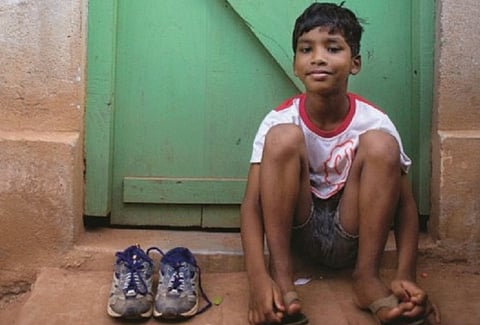

As Budhia's story comes to the big screen with "Budhia Singh: Born to Run", we take a look at the young runner's life, and that of a few other athletes who hope to represent the country's hopes for sporting success.
On an early morning in May 2006, a lean four-year-old boy from the slums of Odisha sought the blessings of the deity Jagannath at the world-famous 12th century temple in Puri, before beginning a run that would change the course of his life.
By the time he finished that run and reached the capital city of Bhubaneswar, he had covered an astonishing 65 km in seven hours, earning an entry in the Limca Book of Records and what seemed like a place of his own in the nation’s imagination as India’s “marathon boy”.
But his fall from fame was just as meteoric, and in a couple of years he had almost completely disappeared from the public gaze. But, a decade later, as Budhia's life and relationship with his former coach, Biranchi Das – shot dead in 2008 – gets set to hit the screens as a feature film some of the public attention has returned to the child superstar.
In a telephone conversation with The News Minute, the now-teenaged Budhia says that while he has not yet watched the Soumendra Padhi-directed film "Budhia Singh – Born to Run", he feels good that his story is being made into a film.
On those tempestuous years in the public glare, he says he does retain some memories of his running experiences, but it is his former coach and judo trainer Biranchi Das, the man credited with discovering his potential who remains most in his mind. "'Aur zyada bhaago, tez bhaago’. (Run more, run fast), he used to tell me. If it wasn't for him, I wouldn't be here," says Budhia.
Often called a father figure to Budhia, Biranchi’s relationship with the boy was also at the heart of the controversy. At one point, he was accused of exploiting the child and Budhia and his mother even accused him of torture. Biranchi had then called the charges "a conspiracy against me hatched by the [Orissa] state government's child welfare department". And Budhia himself presented a contradictory picture about his coach, saying after Biranchi's death that everyone should "just forget" about the entire episode and his allegations against the man.
Budhia's fall from being a sensation – at one point he was inaugurating stores and unveiling music videos – to being temporarily barred from running to finally receding to the background at a Sports Authority of India (SAI) hostel in Odisha – is ironical as far as the boy himself is concerned. In all the tumult over his life and health, he has been stopped from exploring the one activity that he says he most enjoyed: running marathons.
And he is quick to talk about his dissatisfaction with his current training.
"I feel bad staying in the hostel. The food is not good here. There is strict security around and we are not allowed to go out. To perform well, an athlete's mind should be free, without any disturbance. And it feels like a jail here," he asserts.
To top it all off, he adds, he is being given training as a sprinter instead of as a long-distance runner, and even that for just four hours a day.
While Budhia had a dedicated coach in Biranchi Das, in the hostel there is just one coach for training 12 athletes, he complains. "I can still run marathons. I can run 40km now, which is without training."
While the full truth of the relationship between Budhia and Biranchi has remained something of a mystery even to this day, the one dream the coach had for his ward has always shone through clearly – the dream of guiding Budhia to an Olympic medal some day in the future.
In a 2011 piece for the BBC, film maker Gemma Atwal, who filmed Budhia's life between 2005-10 for the documentary "Marathon Boy", wrote that the last time she saw Biranchi he spoke of the frustration of this dream.
The coach had then told her, "Budhia is a very good child. He and I had a dream. It was not fulfilled. That is the agony for me. In Russia, Korea and China, they start training athletes at the age of three. If you don't take risks you don't get results. I am the person who took risks with Budhia, and I got results."
Today, though Biranchi is not around anymore, Budhia still harbors the dream of making it to the Olympics one day.
Recalling their morning rituals built around his daily practice sessions, Budhia says that the Olympics were always on his coach’s mind. "He used to talk about Olympics. When I watch the Olympics on TV, I feel like taking part in it too."